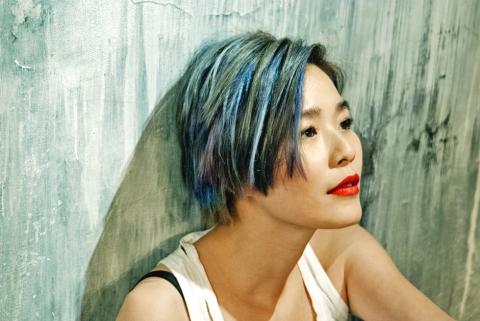Tomorrow’s concert at Kaohsiung Arena for around 8,000 fans will be a watershed moment for Deserts Chang (張懸), who is perhaps Mandarin music’s only truly independent pop singer. The concert may mark a resting point of sorts for her “Deserts Chang” identity — a name she has used to become an award-winning pop star with hundreds of thousands of fans throughout Asia.
Chang’s birth name is Chiao An-pu (焦安溥). She took the name Deserts Chang in her teens while writing song lyrics and poetry and continued to use it when she was a budding popular singer throughout the 2000s.
Two years ago, Chang broke with Sony Music Taiwan, and has since then done some very un-pop-star-like things in terms of admitting to a more natural persona and airing political views, while also embarking on her first ever series of arena performances.

Photo courtesy of Deserts Chang
When the Taipei Times contacted Chang earlier this week, asking about her plans following this weekend’s concert in Greater Kaohsiung, she replied by e-mail, “I’m going to go back to my original name and work on a more complete individual style and more personal works.”
“The name Deserts Chang will only be used where there are chances to release music with ‘universal values.’ However, right now I don’t have any new plans for this name,” she said.
A high-school dropout from an established political family, Chang played guitar and wrote her own songs as a teenager, and signed with Sony Music Taiwan at the age of 19. Initially she was kept in the back of Sony’s stable, where she stayed for about five years until finally releasing her breakout album My Life Will… in 2006.

Photo courtesy of Deserts Chang
In the meantime, Chang cut her teeth in Taipei’s underground music scene, playing small clubs with bands. In 2003, her group Mango Run (芒果跑樂團) won the Indie Music Award at the Ho-Hai-Yan Rock Festival. Even now, she continues to frequent certain Taipei rocker bars, although she keeps a low profile.
Chang’s contract with Sony expired in 2012 after releasing her fourth album, Games We Play (神的遊戲).
“After that album, she thought about retirement,” says Tsai Yu-ching (蔡玉青), her manager, “but she also realized that there were still a lot of creative things she wanted to do.”
Shedding the corporate pop star model, Chang and Tsai became a two-woman team, and together, they cut loose Chang’s artist image and brand identity, allowing “Deserts Chang” to be once again something of a real and natural person.
Chang frequently writes lengthy Facebook posts, intimating personal thoughts and struggles. These have struck a chord with a generation of Taiwanese, who, like her, are coming to know themselves as being politically aware, creative individuals.
Though Chang is not an activist per se, her music and attitude has taken on special relevance in the last two years. Her 2012 song Rose-colored You (玫瑰色的你) was written as a tribute to Taiwan’s social movements and uncannily presaged last year’s Sunflower movement protests, during which young people occupied Taiwan’s national Legislature for over a month.
Rose-colored You is a sort of love song to a student protester, saying, “This moment you’re the most naive of people / holding no Magic Flute in your hand, just a beat-up banner / Waving it like a naughty child; You’re not afraid of dirty games / You look tired to death but you don’t stop / I love you like that / Unwilling to change, rose-colored you.”
In 2013, Chang unveiled a Republic of China (ROC) flag brought to her University of Manchester performance by a Taiwanese fan. Last year, she offered support to the Sunflower protests, though only in a general way. Both times, Chinese netizens labeled her a “pro-Chinese independence singer,” and one concert in China was canceled as a result.
“I don’t really believe in the rightness or wrongness of a single incident. What I support is the process of thought and expression of the citizens of our era, Chang said.
“Some of my songs are related to these ideas, but they were not written to support any specific events,” she said.
Chang launched her current arena concert series last year, performing for over 3,000 people in Hong Kong’s Star Hall, then 12,000 people over two nights in Taipei’s Nangang Exhibition Center.
“She chose Nangang because she wanted it to be like the performance of an international band,” Tsai said. “Radiohead, Bruno Mars and Lady Gaga have all played there, but she was the first Chinese artist to use this space, though Faith Yang (楊乃文) performed there a few months after her.”
“Generally speaking, I don’t like large format concerts, so I’ve tried to avoid them” said Chang, adding that such a performance “must be a creative work,” not just an event that gathers together the biggest possible audience.
Tomorrow’s show is Chang’s final such arena show as currently planned. It will use large backing projections on two screens, and Chang will perform her music with long-time collaborators from the band Algae.
And once the show is over?
“Looking forward, one of the most important thing I need to do for myself is to start a new stage in my life. I need to live and to experience life in the moment rather than living in my past experiences and feelings. When you’re living the life of a pop singer, personal enrichment is very difficult,” says Chang.
This could mean that “Deserts Chang” will become a less visible figure in the future. But even if this is the case, her fans should still be able to look forward to the career of a somewhat less known artist named Chiao An-pu.
■ Deserts Chang performs tomorrow at 7:30pm at Kaohsiung Arena (高雄巨蛋), 757 Bo-ai 2nd Rd, Greater Kaohsiung (高雄市博愛二路757號). Tickets are NT$800 to NT$3,600 through iBon.

Under pressure, President William Lai (賴清德) has enacted his first cabinet reshuffle. Whether it will be enough to staunch the bleeding remains to be seen. Cabinet members in the Executive Yuan almost always end up as sacrificial lambs, especially those appointed early in a president’s term. When presidents are under pressure, the cabinet is reshuffled. This is not unique to any party or president; this is the custom. This is the case in many democracies, especially parliamentary ones. In Taiwan, constitutionally the president presides over the heads of the five branches of government, each of which is confusingly translated as “president”

Sept. 1 to Sept. 7 In 1899, Kozaburo Hirai became the first documented Japanese to wed a Taiwanese under colonial rule. The soldier was partly motivated by the government’s policy of assimilating the Taiwanese population through intermarriage. While his friends and family disapproved and even mocked him, the marriage endured. By 1930, when his story appeared in Tales of Virtuous Deeds in Taiwan, Hirai had settled in his wife’s rural Changhua hometown, farming the land and integrating into local society. Similarly, Aiko Fujii, who married into the prominent Wufeng Lin Family (霧峰林家) in 1927, quickly learned Hoklo (commonly known as Taiwanese) and

The low voter turnout for the referendum on Aug. 23 shows that many Taiwanese are apathetic about nuclear energy, but there are long-term energy stakes involved that the public needs to grasp Taiwan faces an energy trilemma: soaring AI-driven demand, pressure to cut carbon and reliance on fragile fuel imports. But the nuclear referendum on Aug. 23 showed how little this registered with voters, many of whom neither see the long game nor grasp the stakes. Volunteer referendum worker Vivian Chen (陳薇安) put it bluntly: “I’ve seen many people asking what they’re voting for when they arrive to vote. They cast their vote without even doing any research.” Imagine Taiwanese voters invited to a poker table. The bet looked simple — yes or no — yet most never showed. More than two-thirds of those

In the run-up to the referendum on re-opening Pingtung County’s Ma-anshan Nuclear Power Plant last month, the media inundated us with explainers. A favorite factoid of the international media, endlessly recycled, was that Taiwan has no energy reserves for a blockade, thus necessitating re-opening the nuclear plants. As presented by the Chinese-language CommonWealth Magazine, it runs: “According to the US Department of Commerce International Trade Administration, 97.73 percent of Taiwan’s energy is imported, and estimates are that Taiwan has only 11 days of reserves available in the event of a blockade.” This factoid is not an outright lie — that